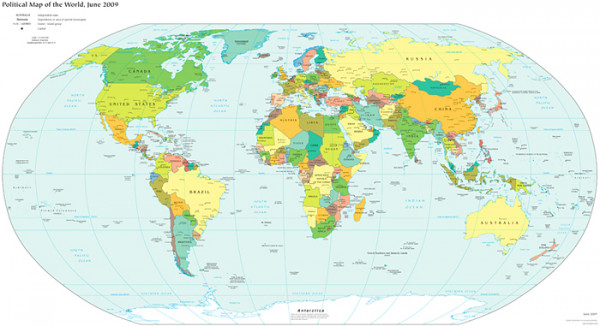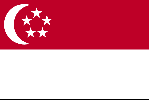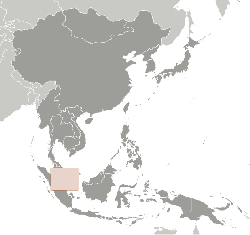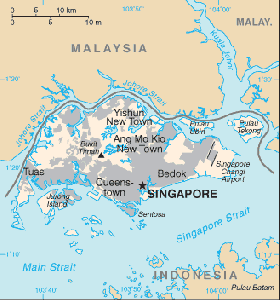Singapore: The Lion City
The founder of Singapore was Sang Nila Utama. He saw an animal when he was on the island. Therefore he gave the island the Malay name "Singapura", which means "Lion City". However, lions have never lived on the island. The animal he saw was probably a tiger.
Overview
| Flag |
|
| Anthem |
Majulah Singapura
Watch on youtube (with lyrics)
|
| Official language(s) |
English / Malay / Mandarin Chinese / Tamil |
Demonyma name for a resident of a locality, often the same as the name of the people's native language
|
Singaporean |
| Government |
Parliamentary republic |
| Area |
710.2 km2, 274.2 sq mi |
| Population |
~ 5 million |
| Currency |
Singapore dollar (SGD) |
| Internet TLD |
.sg |
Geography
Singapore is an island in South Asia. It is
offdistant from the southern tip of the Malay
Peninsulaa piece of land projecting into water from a larger land mass, 137 kilometres (85 mi) north of the equator. It is separated from Malaysia by the
Straitsa narrow channel of water connecting two larger bodies of water of Johor to its north, and from Indonesia's Riau Islands by the Singapore Strait to its south.
Singapore is an island city-state. That means that the whole island functions as a single city. About 5 million people live and work in Singapore.
Society and culture
Singapore has a very
diverseconsisting of many different elements population. Therefore, Singaporean culture has often been described as a mix of cultures – British, Malay, Chinese, Indian and Peranakan.
Population
Singapore is the second most
densely populatedmany people living in an area country in the world after Monaco. Approximately 42% of the population in Singapore are
foreignerspeople from a different country. Most foreigners come from China, Malaysia, Philippines, North America, Middle East, Europe, Australia, Bangladesh and India. Around 74% of Singapore's
residentspeople living in an area are Chinese, 13.4% are Malays, 9.2% Indians.
Languages
Singapore has four official languages: English, Malay, Mandarin Chinese and Tamil. English is the most dominant language in Singapore. The spelling and vocabulary used are
primarilymostly those of British English. Mandarin Chinese is also widely spoken in Singapore. Malay is spoken by 25% of the population, Tamil by only 5%.
Religion
Buddhism is the dominant religion in Singapore. 42.5% of the population of Singapore is Buddhist. Other religions include Islam (14,9%), Christianity (14.6%), Taoism (8.5%) and Hinduism (4%). Around 14% of the population claim to have no religion.
Government and politics
Singapore is a
parliamentaryhaving the supreme executive and legislative power resting with a cabinet of ministers chosen from, and responsible to a parliament republic. It has a
unicameralhaving one chamber government. The Constitution of Singapore establishes
representative democracya government under the representative rule of the people as the nation's political system. The People's Action Party (PAP) dominates the political process. The
executiveresponsible for enforcing laws and judicial decisions, and for the day-to-day running of the state power rests with the cabinet, headed by the Prime Minister.
Economy
Singapore has a highly developed economy. Along with Hong Kong, South Korea and Taiwan, Singapore is one of the Four Asian Tigers. The economy depends heavily on exports and
refiningthe process of purification of a substance imported goods. Singapore has one of the
busiesthaving a lot going on portsa place on the coast at which ships can shelter, or dock to load and unload cargo or passengers in the world. The state is the world's fourth largest foreign exchange trading centre after London, New York and Tokyo. Singapore's economy has been ranked amongst the world's ten most open, competitive and
innovativecharacterised by the creation of new ideas or things economies.







